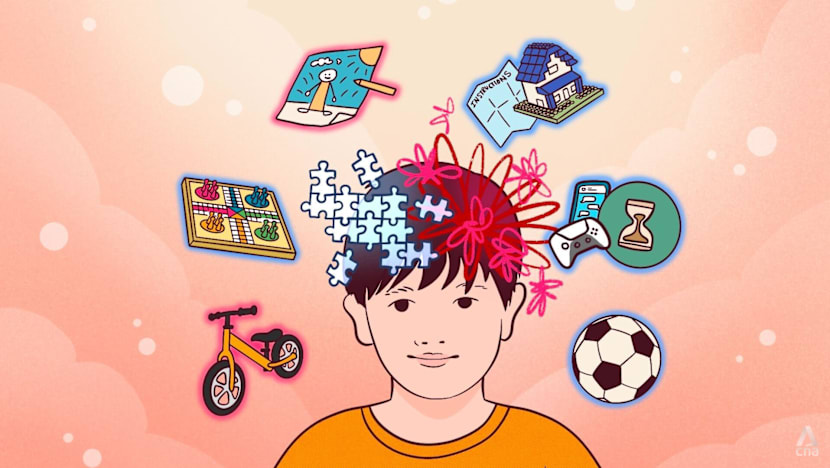Lifestyle
Singapore’s Children Shift from Outdoor Play to Structured Activities

Children in Singapore are increasingly spending their free time engaged in structured activities rather than playing outdoors. A recent study by non-profit organization Suncare SG revealed that nearly one in five parents reported their child spends less than one hour outdoors each day during weekends. This trend raises concerns about the impact of reduced unstructured play on children’s social skills and emotional development.
Twelve-year-old Geralyn Gui epitomizes the modern child’s schedule. With just one hour after school before her evening wushu lessons, she and her friends often gather at a nearby playground or library, always under adult supervision. “We would like her to play unsupervised, but supervision is more for ensuring safety against predators,” said Geralyn’s mother, Selena Tay, a flexi-adjunct teacher. This pattern is not unique to Geralyn; many children in Singapore follow similar routines dictated by academic pressures and a focus on enrichment activities.
The issue of outdoor play is compounded by the weather. Parents like Quek Jia Ling express concerns about the heat limiting outdoor time. Her two children, aged four and seven, often alternate between enrichment classes and supervised play. “The hot weather makes it even harder to take them outside,” she noted. This sentiment is echoed by many parents who feel that outdoor play has become a luxury rather than a norm.
According to the Institute of Policy Studies, younger Singaporeans, aged 18 to 35, report having fewer close friends than older generations, suggesting a trend toward social isolation. The pandemic has only intensified these challenges, limiting face-to-face interactions and deepening divides. Dr. Isabelle Gaffney, a registered play therapist, emphasizes that children need time to play and interact freely. “Missing out on time together can curtail their main outlet for sharing emotions and cause them to feel left out,” she explained.
The shift to structured activities often comes from a place of concern for children’s safety. Dr. G Kaveri, a senior lecturer in early childhood education at Singapore University of Social Sciences, pointed out that parents tend to choose activities perceived to offer safety and predictability. While these structured programs can be beneficial, they often lack the spontaneity that comes with unstructured play.
Parents like Dr. Shaun Ho sign their children up for programs like canoeing at the Active SG Canoe Academy to blend fun with skill development. His son, Ernest, enjoys the challenge and camaraderie, highlighting the importance of guided activities in today’s context. Yet, such programs cannot fully replace the social skills acquired through free play and unplanned interactions.
The shift from outdoor play to structured settings has led to a generation that often interacts online rather than face-to-face. For example, 19-year-old Loh Yong Qi found community online, bonding with peers over shared interests. Despite this, she notes that real-life interactions are more meaningful. “Building real connections works better in person,” she said.
Experts warn that this reliance on digital interaction can stunt children’s social development. Dr. Choo Hyekyung from the National University of Singapore emphasized the irreplaceable value of face-to-face interactions, which offer opportunities for emotional responses and conflict resolution that digital spaces cannot replicate.
Parents like Ruchi Parekh recognize the importance of outdoor play. She ensures her children spend time outside before screen time, yet her 13-year-old daughter enjoys more independence than her nine-year-old son, who remains under close supervision. “I am okay with being an extra cautious parent,” she remarked, underscoring the prevailing sentiment among parents today.
Despite these challenges, parents acknowledge the need for children to engage in free play. Ms. Rohainizah Adnan pointed out that the noise complaints from playgrounds and the lack of safe, open spaces are significant barriers. “We need to let children be children and have spaces for them,” she stated.
As Singapore’s built environment changes, the availability of open spaces has diminished. Newer Housing and Development Board (HDB) flats have fewer corridors and void decks conducive to spontaneous play. This change has made it more challenging for children to socialize freely, especially as they enter their teenage years.
The shift toward structured activities and online interactions has raised concerns about the long-term implications for social skills and community engagement. As parents navigate these changes, the balance between safety, structured learning, and the innate need for unstructured play remains a critical discussion point for families in Singapore.
-

 Lifestyle4 months ago
Lifestyle4 months agoHumanism Camp Engages 250 Youths in Summer Fest 2025
-

 Business4 months ago
Business4 months agoKenvue Dismisses CEO Thibaut Mongon as Strategic Review Advances
-

 Sports4 months ago
Sports4 months agoDe Minaur Triumphs at Washington Open After Thrilling Comeback
-

 Top Stories4 months ago
Top Stories4 months agoColombian Senator Miguel Uribe Shows Signs of Recovery After Attack
-

 Sports4 months ago
Sports4 months agoTupou and Daugunu Join First Nations Squad for Lions Clash
-

 Health4 months ago
Health4 months agoNew Study Challenges Assumptions About Aging and Inflammation
-

 World4 months ago
World4 months agoASEAN Gears Up for Historic Joint Meeting of Foreign and Economic Ministers
-

 Business4 months ago
Business4 months agoOil Prices Surge Following New EU Sanctions on Russia
-

 Entertainment4 months ago
Entertainment4 months agoDetaşe-Sabah Violin Ensemble Captivates at Gabala Music Festival
-

 Entertainment4 months ago
Entertainment4 months agoBaku Metro Extends Hours for Justin Timberlake Concert
-

 Business4 months ago
Business4 months agoU.S. House Approves Stablecoin Bill, Sends to Trump for Signature
-

 Top Stories4 months ago
Top Stories4 months agoRethinking Singapore’s F&B Regulations Amid Business Closures









